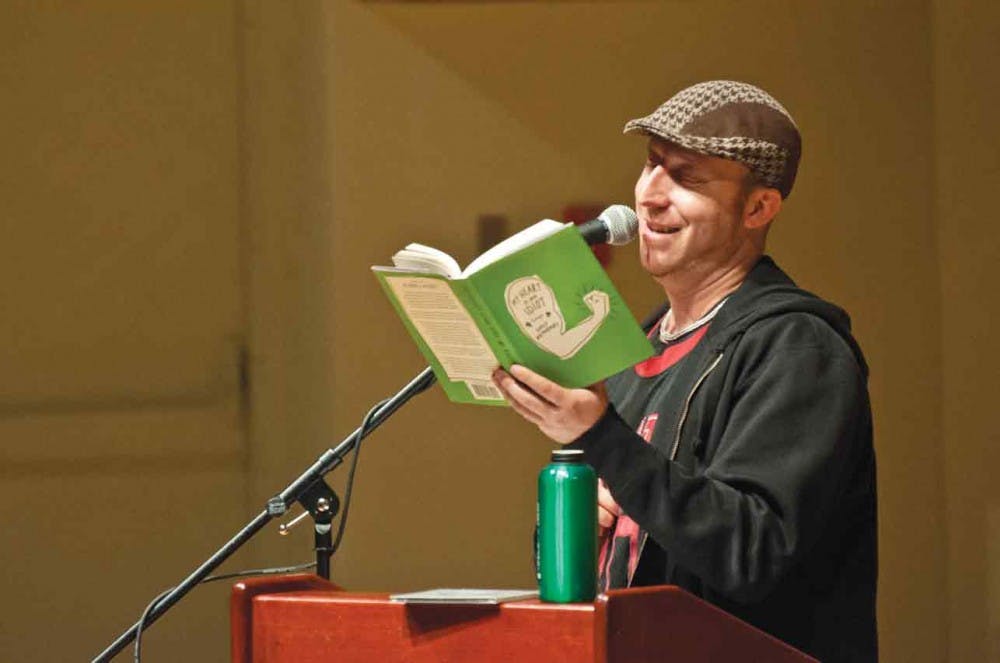At first glance, a cassette tape covered in dirt and a crumpled up piece of paper deserted on an abandoned car are not sources of inspiration.
Taking a closer look at these everyday items is the root of Found Magazine, comprised of objects — written or otherwise — that people find. Founder Davy Rothbart and Peter, his brother, visited Wednesday night at Pruis Hall to celebrate the 10th anniversary of Found and to promote Davy Rothbart’s newest book, “My Heart is an Idiot.”
Davy Rothbart built off the idea of human’s natural curiosity to create the project, which takes a closer glance at the things that most people ignore.
“Taking the time to look at the papers on the street ... that’s when the magic of the world really comes alive,” he said.
Peter Rothbart told the story of a cassette tape stumbled upon by a Michigan boy on his way home from school. The indicators of what the tape could be about were two words: “Booty Tape.” The boy sent it in, along with a list of song titles deduced from the same phrases being repeated on each song. Peter Rothbart described the tape as full of 10 “dickdonkulous, bootylicious rap anthems.”
“Just imagine two kids and a jankity ass Casio going to work,” he said before launching into his rendition of one of the tape’s songs, “The Booty Don’t Stop.”
The lighthearted mood was present for most of the night, but there were serious moments. Before the “Booty” jam, Peter Rothbart told the story about a paper found in a car on the side of a Hawaiian highway. It was a letter to God from a woman questioning her faith after suffering her second miscarriage. He set a somber tone in the room while performing his song “A Child to Call Our Own,” which imagines her partner’s side of the story.
The balance between silly and serious exists in the issues of Found, as well as the entire event.
Elysia Smith, a senior creative writing major, said she “was expecting them to be a little more silly,” but there was a balance that catered to the diverse audience. She also said she prefers the silly things they publish, but the heartfelt pieces are what “complete the magazine.”
As a longtime follower, she cited a budget listing $300 for rent, $250 for groceries, $150 for cat litter and $900 for cocaine as one of her favorite pieces. She has submitted something she found: a multicolored love letter from an eighth-grader.
Although some pieces are simpler, Davy Rothbart said finding these notes can show “how universal the things we are dealing with are,” and that the stories can “make you feel connected to everybody.” Many notes they receive revolve around love and relationships, which he said is “what’s on most people’s minds.”
The relatability goes deeper than the simple stories.
“They’re just a couple guys like me: they’re just fascinated by people,” said Riley Gray, a freshman special education major.
She was pulled onto stage and interviewed by Davy Rothbart, who used questions the audience submitted before the show began.
“We’re surrounded by strangers all the time,” he said.
He urged audience members to talk to the strangers around them, even if it is just for their name.
Keeping the people behind the stories anonymous is something Found strives for, but sometimes their efforts are unsuccessful.
“Several times, someone has gotten in touch with us and said, ‘Hey, that’s mine,’” Davy Rothbart said.
He said some people are mystified by people’s interest in their lives, but they appreciate it upon hearing more about the project.
Davy Rothbart said it is the do-it-yourself spirit that makes the project so valuable and makes the collage of his work reach many walks of life.
“You don’t know what other people [will] respond to,” he said. “[You should] make your own stuff and see what happens.”
Found fosters the natural passions of people and aims to share the curiosity and compassion of humans.
“I really liked the idea behind it,” Gray said. “This is something in middle school or high school you think about doing, but these guys actually did it.”
Davy Rothbart said he never intended or imagined that Found would become so big.
“Any project you’re interested in, you should just do it,” he said. “Don’t wait for someone’s permission or encouragement.”


